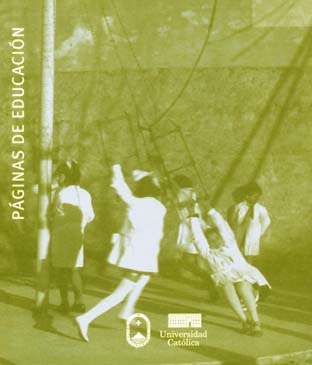Disputes in defining the teaching craft in pre-service field experiences:
A case study on early childhood education
DOI:
https://doi.org/10.22235/pe.v10i2.1418Keywords:
early childhood education, field experiences, supervisors, teaching craft, community of practiceAbstract
In pre-service teacher education, field experiences have been conceived as training devices. This article examines field experiences as spaces of struggle over the definition of the teaching craft inside a community of practice that constitutes both the context and the content of the training process. From a qualitative ethnographic inquiry, it shows the struggle to banish three "enemies" of the teaching craft at early childhood education: the infantilization, schoolification and mechanization. This article concludes that the way in which the battle is set reproduces the very thing it seeks to banish: stereotypes.
Downloads
References
Alliaud, A., y Antelo, E. (2009). Iniciarse a la docencia. Los gajes del oficio de enseñar. Profesorado: Revista de curriculum y formación del profesorado, 13(1), 90-100.
Bernstein, B. (1985). Clasificación y enmarcación del conocimiento educativo. Revista Colombiana de Educación, 15, 34-56.
Bloch, M. N. (2014). Interrogating Reconceptualizing Early Care and Education (RECE) - 20 Years Along. En M. N. Bloch, G. S. Cannella, y B. B. Swadener (Comps.), Reconceptualizing Early Childhood Care and Education: Critical Questions, New Imaginaries and Social Activism: a Reader (pp. 19–32). Nueva York, NY: Peter Lang.
Brailovsky, D. (2006). Maestros jardineros varones: un estudio sobre la normalidad escolar (Tesis de maestría inédita). Escuela de Educación, Buenos Aires, Argentina.
Brailovsky, D. (2016). Didáctica del nivel inicial en clave pedagógica. Buenos Aires, Argentina: NOVEDUC.
Buendı́a, E. (2000). Power and possibility: The construction of a pedagogical practice. Teaching and Teacher Education, 16(2), 147-163.
Cannella, G.S. (1997). Deconstructing Early Childhood Education: Social Justice and Revolution. Nueva York, NY: Peter Lang.
Contu, A., y Willmott, H. (2003). Re-Embedding Situatedness: The Importance of Power Relations in Learning Theory. Organization Science Organization Science, 14(3), 283-296.
Darling-Hammond, L., y Bransford, J. (2005). Preparing teachers for a changing world: What teachers should learn and be able to do. San Francisco, CA: Jossey-Bass.
Diker, G. (2002). Organización y perspectivas de la educación inicial en Iberoamérica principales tendencias. Madrid, España: Organización de los Estados Iberoamericanos
Edelstein, G. (1995). Los sujetos de las prácticas. En G. Edelstein y A. Coria (Comps.), Imágenes e imaginación. Iniciación a la docencia (pp. 36-61). Buenos Aires, Argentina: Kapelusz.
Flick, U. (2004). Introducción a la investigación cualitativa. Madrid, España: Morata.
Flyvbjerg, B. (2006). Five misunderstandings about case-study research. Qualitative inquiry, 12(2), 219-245.
Guber, R. (2001). La etnografía: método, campo y reflexividad. Buenos Aires, Argentina: Norma.
Guevara, J. (2016). La tríada de las prácticas en la formación inicial docente: aportes de investigaciones anglófonas. Espacios en Blanco, 26, 243-271.
Harf, R., Pastorino, E., y Sarlé, P. (1997). Aportes para una didáctica. Buenos Aires, Argentina: El Ateneo.
Huxley, A. (1997). Un mundo feliz. Madrid, España: De bolsillo.
Ivaldi, E. (2014). Educación, arte y creatividad en las infancias del siglo XXI. En P. Sarlé, E. Ivaldi, y L. Hernández (Comps.), Arte, educación y primera infancia: sentidos y experiencias (pp. 11-28). Madrid, España: OEI.
Marcelo García, C., y Vaillant, D. (2009). Desarrollo profesional docente: ¿cómo se aprende a enseñar? Madrid, España: Narcea.
Moss, P. (2007). Meetings across the paradigmatic divide. Educational Philosophy and Theory, 39(3), 229-245.
Núñez, V. (2003). Los nuevos sentidos de la tarea de enseñar. Más allá de la dicotomía'enseñar vs asistir'. Revista Iberoamericana de Educación (OEI), 33, 17-35.
Organisation for Economic Co-operation and Development. (2011). Does participation in pre-primary education translate into better learning outcomes at school? PISA in focus. París, Francia: Organisation for Economic Co-operation and Development.
Peralta, M.V. (2012). Un análisis del desarrollo curricular de la educación parvularia chilena: ¿cuánto se ha avanzado?. Docencia, 48, 60-71.
Phelan, A.M., Sawa, R., Barlow, C., Hurlock, D., Irvine, K., Rogers, G., y Myrick, F. (2007). Violence and Subjectivity in Teacher Education. Asia-Pacific Journal of Teacher Education, 34(2), 161-179. doi: 10.1080/13598660600720561
Pulido, M. (2013). Las rutinas en educación inicial: entre la mecanización y la transformación. Educación y ciudad, (24), 81-92.
Ros, N. (2009). Rutina y rituales en la educación infantil. Buenos Aires, Argentina: Novedades Educativas.
Sarlé, P. (2000). La educación infantil en la República Argentina: entre la tradición y la vanguardia. Trabajo presentado en la 23ª reunión anual de ANPED, Caxambú, Brasil. Recuperado de: http://23reuniao.anped.org.br/textos/0715t.pdf
Schön, D.A. (1987). Educating the reflective practitioner: toward a new design for teaching and learning in the professions. San Francisco, CA: Jossey-Bass.
Sennett, R. (2009). El artesano. Barcelona, España: Anagrama.
Soto, C.A., y Violante, R. (2008). Pedagogía de la crianza: un campo teórico en construcción. Buenos Aires, Argentina: Paidós.
Stake, R.E. (1998). Investigación con estudio de casos. Madrid, España: Morata.
Tenti Fanfani, E. (2007). Consideraciones sociológicas sobre profesionalización docente. Educação & Sociedade, 28(99), 335-353.
Terigi, F. (2002). Análisis comparativo de los currículos iberoamericanos: procesos, condiciones y tensiones que debemos considerar. Trabajo presentado en el IV Encuentro Internacional de Educación Inicial y Preescolar, La Habana, Cuba. Recuperado de http://www.oei.es/linea3/terigi.pdf
Vaillant, D. (2007). Organización de las prácticas y de las residencias pedagógicas: una perspectiva internacional. Trabajo presentado en la Reunión técnica sobre residencias pedagógicas (MINCyT, INFD). Buenos Aires, Argentina.
Varela Fernández, J. (1992). Categorías espacio-temporales y socialización escolar: del individualismo al narcisismo. Revista de Educación, (298), 7-29.
Wenger, E. (1998). Communities of practice: learning, meaning, and identity. Cambridge, Inglaterra: Cambridge University Press.















